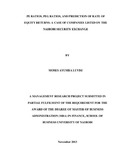Pe ratios, peg ratios, and prediction of rate of Equity returns: a case of companies listed on the Nairobi Security Exchange
| dc.contributor.author | Luvisi, Moses A | |
| dc.date.accessioned | 2014-01-13T07:38:54Z | |
| dc.date.available | 2014-01-13T07:38:54Z | |
| dc.date.issued | 2013 | |
| dc.identifier.citation | Master of Business Administration | en_US |
| dc.identifier.uri | http://hdl.handle.net/11295/63267 | |
| dc.description.abstract | The stock market is a primary capital market through which companies and other institutions can raise funds by issuing shares or loan stock but is more important as a secondary market for existing securities. The Study thus seeked to provide empirical evidence on whether the widely held beliefs of the predictability of the PEG and the PE ratios holds true in the emerging markets. It further aimed to test whether the correlations improves when both ratios are used in prediction of abnormal equity returns.Specificobjective of the study was to investigate the relationship between price earnings ratios (PE) and stock returns establish any correlation existing between PEG and stock returns and to compare predictability power of PE and PEG on stock returns. The theories supporting these are Technical analysis theory and Market efficiency theory. The problem was studied using the causal research design. The population of interest in this study consisted of firms listed in the Nairobi Securities Exchange from which samples of seventeen companies wereselected.Secondary data was collected from NSE.Regressiion model was used to analyse the data. Findings fromthe study revealed that strong correlation between PE and PEG ratios existesd. It was determined that the two ratios cannot be reliably used to predict stock returns. R Square showed that 9% of the variations in stocks returns could be explained by the explanatory variables and 91% of the variations in stocks returns are unexplained and are taken by error term. The Betacoefficient of PE ratio to Stock returns is 0.206 which is insignificant given a P- Value of 0.763 whereas the cut offP-Value is 0.05 .This can be interpreted as an increase of 1 unit in PE will not significantly increase Stock returns. Similarly the Beta-coefficient of PEG to Stocks returns is 0.115 which is insignificant given a P-Value of 0.867 whereas the cut off P-Value is 0.05. This can also be interpreted as an increase of 1 unit in PEG will not significantly increase Stock returns. The Study agreed with other studies in developed stock markets and provided empirical evidence on widely held beliefs of the predictability of the PEG and the PE ratios in an emerging market. The findings of the study have considerable importance to directors of companies who wish to provide satisfactory returns to their shareholders | en_US |
| dc.language.iso | en | en_US |
| dc.publisher | Unversity of Nairobi | en_US |
| dc.title | Pe ratios, peg ratios, and prediction of rate of Equity returns: a case of companies listed on the Nairobi Security Exchange | en_US |
| dc.type | Thesis | en_US |

